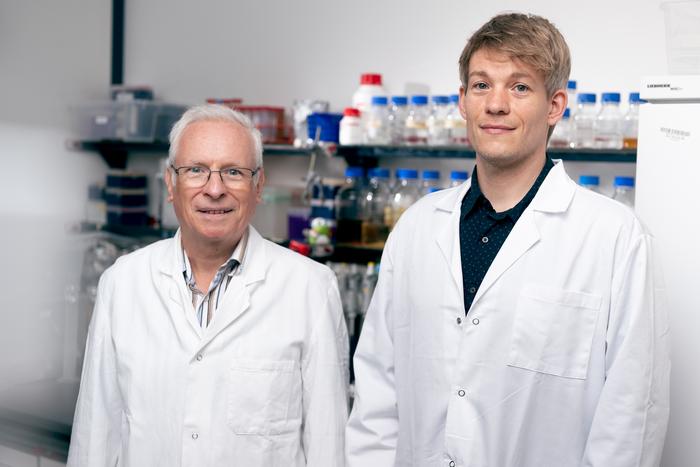A German-American research team led by microbiologist Dr Gerrit Wienhausen from the University of Oldenburg (Germany) has come an important step closer to a better understanding of highly complex interactions between marine microorganisms. The researchers conducted various experiments to analyse the interaction between two species of marine bacteria from the North Sea in the synthesis of vitamin B12, and have now published their findings in the scientific journal Nature.
Vitamin B12 is a vital but scarce commodity in the sea (and elsewhere). It is essential not only for the metabolism of the two bacteria investigated in this study, but for many other marine organisms. “Half of all algal species cannot survive without this vitamin,” Wienhausen explains. Yet like humans, algae cannot produce B12 themselves. So the researchers from the University of Oldenburg and the Scripps Institution of Oceanography in San Diego (USA) were eager to take a closer look at B12 synthesis in marine bacteria.
While certain bacterial strains are known as vitamin B12 producers, this research project focused on two strains of the Roseovarius and Colwellia genera that each produce just one of the two building blocks of vitamin B12, meaning that they can only synthesise the substance in cooperation with each other. “It’s fascinating how complex the interactions between bacteria can be,” emphasises Wienhausen with reference to the new study, which was conducted as part of the Roseobacter Collaborative Research Centre headed by Oldenburg microbiologist Prof. Dr Meinhard Simon, who also co-authored the current publication.

Credit: University of Oldenburg / Marcus Windus
A German-American research team led by microbiologist Dr Gerrit Wienhausen from the University of Oldenburg (Germany) has come an important step closer to a better understanding of highly complex interactions between marine microorganisms. The researchers conducted various experiments to analyse the interaction between two species of marine bacteria from the North Sea in the synthesis of vitamin B12, and have now published their findings in the scientific journal Nature.
Vitamin B12 is a vital but scarce commodity in the sea (and elsewhere). It is essential not only for the metabolism of the two bacteria investigated in this study, but for many other marine organisms. “Half of all algal species cannot survive without this vitamin,” Wienhausen explains. Yet like humans, algae cannot produce B12 themselves. So the researchers from the University of Oldenburg and the Scripps Institution of Oceanography in San Diego (USA) were eager to take a closer look at B12 synthesis in marine bacteria.
While certain bacterial strains are known as vitamin B12 producers, this research project focused on two strains of the Roseovarius and Colwellia genera that each produce just one of the two building blocks of vitamin B12, meaning that they can only synthesise the substance in cooperation with each other. “It’s fascinating how complex the interactions between bacteria can be,” emphasises Wienhausen with reference to the new study, which was conducted as part of the Roseobacter Collaborative Research Centre headed by Oldenburg microbiologist Prof. Dr Meinhard Simon, who also co-authored the current publication.
Complex interactions between two strains of bacteria
Using complex lab experiments and cutting-edge analytical tools, the researchers were able to explore the interactions between the two bacterial strains in detail. According to their findings, bacteria of the Colwellia strain M166 synthesise the smaller building block for vitamin B12 and release it into the surrounding water. For their part, the bacteria of the Roseovarius strain M141 not only produce the larger building block – which is the main component – but are also able to synthesise the B12 that both bacterial strains require from the combination of the two building blocks.
However, the Roseovarius strain doesn’t release the vitamin on its own, but only once Colwellia activates a virus encoded in the bacterial genome of its co-producer and the virus multiplies. The resulting viral infection causes some of the affected Roseovarius bacteria to burst, and vitamin B12 is released alongside the virus, thus becoming available to Colwellia (and possibly other marine organisms, too). “This fine-tuned cross-feeding of metabolic building blocks and products may not only be relevant in marine microbial communities but also in other ecosystems,” the researchers from the Oldenburg Institute for Chemistry and Biology of the Marine Environment (ICBM) and the Scripps Institution of Oceanography report in Nature.
“We were able to demonstrate for the first time that two bacteria only synthesise B12 in cooperation with each other,” says Wienhausen. “Such a complex form of interaction between bacteria was previously unknown.”
More than 60 researchers from Oldenburg, Braunschweig, Göttingen and Bonn investigated the bacteria of the Roseobacter group over the past 13 years within the Transregional Collaborative Research Centre (CRC) Roseobacter, which is funded by the German Research Foundation (DFG). These bacteria are found in all marine habitats – from the tropics to the polar seas and from the sea surface to the deep sea. Among other achievements, the researchers have discovered many new strains and described their distribution and functional biogeography in the world’s oceans for the first time. More than 280 scientific articles based on research conducted within the context of the CRC have been published to date.
Journal
Nature
Method of Research
Experimental study
Subject of Research
Cells
Article Title
Ligand cross-feeding resolves bacterial vitamin B12 auxotrophies
Article Publication Date
8-May-2024



